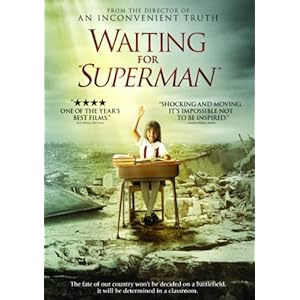 Usually, watching a documentary involves me learning lots of new things with a reaction like, "Really?! Wow! I didn't know that!" But in this case, as a former high school teacher, I actually have inside knowledge about the public education system, the topic of the documentary. Armed with additional information, I've decided that this film is a skewed presentation of only some of the facts, and it does not provide all sides of the story.
Usually, watching a documentary involves me learning lots of new things with a reaction like, "Really?! Wow! I didn't know that!" But in this case, as a former high school teacher, I actually have inside knowledge about the public education system, the topic of the documentary. Armed with additional information, I've decided that this film is a skewed presentation of only some of the facts, and it does not provide all sides of the story.This documentary highlights some of the problems faced by public schools - mostly inner city schools in poor neighborhoods - and it paints a pretty depressing picture. While it poses the question of whether bad neighborhoods create failing schools, or if failing schools create bad neighborhoods, it doesn't actually make much of an effort to answer that question. Instead, it makes a pretty bold conclusion that bad teachers are the problem, and charter schools are the panacea. The documentary holds up Michelle Rhee as a positive figure, but for me, this film simply reinforced the reasons why I'm not a fan.
In regards to teachers: There was no mention of how these bad teachers came to be. There was no discussion about the lack of good mentoring programs for new teachers, the lack of on-going professional development for experienced teachers, the lack of sufficient evaluation processes, or why school administrators allowed these poor teachers to stay on in the first place. The fact that 50% of teachers leave the profession within the first 5 years - a fact that this documentary leaves out - says a lot about the working conditions, and begs the questions, "Are the good teachers leaving or staying? And why is that?"
In regards to charter schools: This documentary - like many sources that put charter schools on pedestals - conveniently neglects to point out that charter school students, though selected at random from an applicant pool, are a self-selected subgroup made up of motivated kids with involved parents. When quoting the numbers that indicate success, the film also overlooks the fact that in many cases, the size of a particular class is smaller than what it started as; perhaps some students voluntarily transferred to other schools, but it's worth noting that charter schools are allowed to kick out or force out students based on whether or not they meet the standards of the school.
The documentary showcases a handful of families in which very concerned parents enter their kids into lotteries for acceptance into charter schools. As a viewer, you certainly get the feeling that these kids might not "make it" unless they get accepted; you get the impression that if they are forced to enter the public school system, they will fall through the cracks and will be doomed never to succeed. Though I certainly felt disappointed for the families that did not win the charter school lottery, I still couldn't help but feel that because these families were the ones in which the parents do care, because these kids do want an education, they would probably turn out okay (I hope).
To the documentary's credit, I do agree with its portrayal of tenure - it is too easily obtained, it provides excessive job security, and it makes it nearly impossible to get rid of an ineffective teacher.


No comments:
Post a Comment